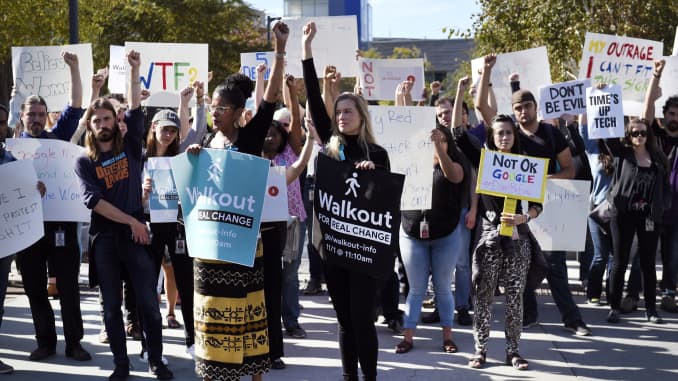Organizing Google

More than 225 Google engineers and other workers have formed a union, the group revealed on Monday, capping years of growing activism at one of the world’s largest companies and presenting a rare beachhead for labor organizers in staunchly anti-union Silicon Valley.
The union’s creation is highly unusual for the tech industry, which has long resisted efforts to organize its largely white-collar work force. It follows increasing demands by employees at Google for policy overhauls on pay, harassment and ethics, and is likely to escalate tensions with top leadership.
The new union, called the Alphabet Workers Union after Google’s parent company, Alphabet, was organized in secret for the better part of a year and elected its leadership last month. The group is affiliated with the Communications Workers of America, a union that represents workers in telecommunications and media in the United States and Canada.
But unlike a traditional union, which demands that an employer come to the bargaining table to agree on a contract, the Alphabet Workers Union is a so-called minority union that represents a fraction of the company’s more than 260,000 full-time employees and contractors. Workers said it was primarily an effort to give structure and longevity to activism at Google, rather than to negotiate for a contract.
I especially want to note this bit:
Traditional unions typically enroll a majority of a work force and petition a state or federal labor board like the National Labor Relations Board to hold an election. If they win the vote, they can bargain with their employer on a contract. A minority union allows employees to organize without first winning a formal vote before the N.L.R.B.
The C.W.A. has used this model to organize groups in states where it said labor laws were unfavorable, like the Texas State Employees Union and the United Campus Workers in Tennessee.
The structure also gives the union the latitude to include Google contractors, who outnumber full-time workers and who would be excluded from a traditional union. Some Google employees have considered establishing a minority or solidarity union for several years, and ride-hailing drivers have formed similar groups.
The United Campus Workers in Tennessee is what I helped organize when it was a baby organization. In fact, I ran the first meeting of angry workers (dorm housekeepers) who were furious and ready to fight and it was amazing. I say this not to brag–I’m not much of an organizer at all–but simply to state that it’s very gratifying to have played a role in something like this, even if I left soon after to start my Ph.D. program. That this model is being expanded across the nation by CWA is really wonderful.
As for the reasons the union is needed, while rich techbros whine about it, read the words of the heads of the new unit.
On Nov. 1, 2018, at 11:10 a.m., some 20,000 Google employees, along with employees of Waymo, Verily and other Alphabet companies, stopped working and walked off the job in cities around the world. A week earlier, The New York Times reported that the company had paid tens of millions of dollars to two executives who had been accused of sexual misconduct toward our co-workers, staying silent about the alleged abuse and letting them walk away with no consequences.
People speaking at the protests that morning recounted their own experiences of harassment and discrimination at the company. In San Francisco, one woman held up a sign reading, “I reported and he got promoted.” Others read, “Happy to quit for $90 million, no sexual harassment required” and “Unfair workplaces create unfair platforms.”
We’d had enough.
The two of us are software engineers, and we were recently elected executive chair and vice chair of the Alphabet Workers Union, a group of more than 200 workers in the United States who believe our company’s structure needs to change.
For far too long, thousands of us at Google — and other subsidiaries of Alphabet, Google’s parent company — have had our workplace concerns dismissed by executives. Our bosses have collaborated with repressive governments around the world. They have developed artificial intelligence technology for use by the Department of Defense and profited from ads by a hate group. They have failed to make the changes necessary to meaningfully address our retention issues with people of color.
This sort of thing is the future of unionism. And this is a huge, enormous victory. Let’s hope Silicon Valley can build on it.


